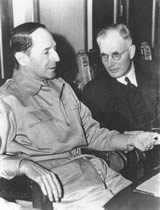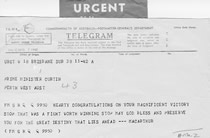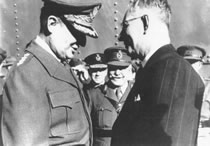
JCPML. Records of Douglas MacArthur. General MacArthur with Prime Minister John Curtin, 194? JCPML00265/1.Original held by MacArthur Memorial Library and Archives: MML&A 9550.
In broad terms there are two sharply contrasting assessments of the Curtin-MacArthur relationship. The notion of the effective and powerful collaboration, especially in the critical days of 1942, is centred around the 'You take care of the rear and I will handle the front' dictum put forward by MacArthur. Essentially, Curtin and his government accepted MacArthur as their key military adviser while also seeking, all too often unsuccessfully, to use him as a channel for obtaining additional military resources withheld because of the 'beat Hitler First' strategy of the Allied High Command. From MacArthur's perspective his relationship with Curtin provided an additional source of support in his quest for substantial additional resources for his command area and also ensured political stability within Australia. At the personal level each paid testimony to the other and there are strong grounds for the assertion that their 'close and enduring' relationship provided a strong and highly effective civil-military partnership that contributed significantly to the fact that in less than a year from their first meeting the tide of war had turned both at sea and on land and the threat of invasion had disappeared. This was all the more significant given their failure at any stage to secure from the Allied High Command anything like the additional military resources which were constantly requested.
By contrast, over the years a number of historians have queried and even rejected outright the view that the General and the Prime Minister had a close and effective relationship with little if any downside for Australia. There are several strands to the alternative view, not the least the assertion that the Japanese never had any coherent plan to invade Australia.1
JCPML. Records of the Curtin Family. Telegram from General MacArthur to John Curtin re victory, ca 1943. JCPML00401/38.
'Hearty congratulations on your magnificent victory. That was a fight worth winning. May God bless and preserve you for the great destiny that lies ahead.'
However, the central point at issue derives from the assertion, in the words of military historian Gavin Long, that during the Curtin-MacArthur era, the Australian Government 'had made a notable surrender of sovereignty' when 'no Australian government would have so completely surrendered control of its forces in its own territory to a British commander and staff'. In Long's view, a 'strange aspect of this alliance of an Australian government and an American commander' was how far apart were 'their views on international and local politics'.2 So complete was the surrender of sovereignty that MacArthur from the outset appointed Americans to lead every branch of his staff even though there were several highly qualified Australian Army specialists who had the additional advantage of 'recent and varied active service'.3 Similarly, at the 'higher political, military and administrative levels' the relatively few points of contact were testimony to 'the thorough way in which strategical control had been surrendered to the American Joint Chiefs of staff and their local subordinate, General MacArthur' with the latter dealing only with Curtin and Blamey and his chief of staff.4 As a consequence, Long argued, the Australian government had virtually no share in the making of key strategical decisions even though for the first twelve months at least it contributed 'the greater part' of the forces under the South-West Pacific Command. Peter Edwards suggests that in Long's view the surrender of control was 'politically distasteful and strategically futile'.5
In a modified version of this view Roger Bell has argued that Australia under Curtin at least 'sought jealously to preserve the maximum possible domestic sovereignty under the new military condition'. For example, Curtin insisted that local commanders could have direct access to the Australian government and he obtained from MacArthur an acceptance that he (MacArthur) 'could not act without the approval of Australian government on matters affecting the Australian people or deployment of their military forces'.6 On the other hand, David Horner stresses the fact that even Blamey, unlike Defence Secretary Sir Frederick Shedden, did not regularly attend meetings of the all powerful Prime Minister's War Conference and that the attempts of MacArthur, Curtin and Shedden to influence global strategy ' achieved little'. In this situation Peter Edwards affirms: 'Blamey and the three Australian chiefs of staff were effectively excluded from decision making'.7
Why had this situation developed in the way it did? Essentially, according to Long it was simply that the Americans appeared to possess the power which Britain now lacked, and the Australian leaders were willing to take extreme measures to attract that power across the Pacific.8
How far did this situation extend to allowing MacArthur to influence what happened in the 'rear', namely the local political front? According to David Horner. the notes kept at the time by Defence Secretary Shedden 'provide excellent 'support for the contention' that MacArthur 'precipitated the move' to change the Defence Act.9 Shedden's version was that a formula needed to be found to 'amalgamate the AIF and the AMF' which
while not giving any credit to the Opposition, would enable the Government to get out of what he felt would be an increasingly difficult position' and would be 'important in influencing American public opinion'.
Statement by the Prime Minister about MacArthur Day, 13th June 1942.
'The Australian Government and people join with
the deepest pleasure in the celebration of this day, set aside by
the United States Government in honor of General Douglas
MacArthur.
The warmth of the spontaneous welcome which was extended to General
MacArthur on his arrival in this country has been widened to a
feeling on the part of the Australian people of the greatest
confidence in his leadership, of repect for his character and of
esteem for his manly qualities.
Were these times of peace, the United States could have no more
popular ambassador than this soldier who has won not only our
hearts but our strongest regard.
Australians have no doubt that General MacArthur's mission will
succeed. As I have said before, General MacArthur declared that one
day he would return to the Philippines and that that was a solemn
pledge that we would help him to keep. I repeat now, that under
General MacArthur, the forces of the United Nations in this theatre
of war will go on to victory.'
Courtesy National Archives of Australia: A5954, 289/5
This contrasts with Paul Hasluck's conclusion written several years earlier:
There appears to be no evidence, other than rumours current during the controversy, that either MacArthur or the United States Government had suggested or sought "conscription" of the Australian militia.10
Rather, according to Hasluck, the public evidence suggested that Curtin's 'calculation of political chances at the coming election and his shrewd response to the political campaigning of the Opposition were the decisive influence'. Hasluck also contended that Curtin's decision was made 'quickly, privately and without the knowledge of his colleagues'.11
Writing after Hasluck but before Horner, Peter Love had already contended that MacArthur 'precipitated the move' and that 'a web of military and diplomatic considerations was paramount in Curtin's decision'.12 Love cites transcripts of confidential press briefings by Curtin to press journalists at the time in which journalist Frederick T Smith recorded that MacArthur had made the 'one army request' to Curtin but the prime minister did not want it said 'that MacArthur actually asked for it' because 'technically' it was a political matter with which MacArthur should have no concern.13 In similar vein, a journal kept by MacArthur's British Liaison Officer claimed that MacArthur had spoke of a promise made by Curtin soon after he [MacArthur] had reached Australia that Australian troops 'should fight' wherever MacArthur needed them in the South West Pacific Area.14
JCPML. Records of Douglas MacArthur. General MacArthur shakes hands with PM Curtin who had just returned from the USA, 1944. JCPML00265/8. Original held by MacArthur Memorial Library and Archives: MML&A 9827.
|
|
||
|
|
||


s.jpg)
